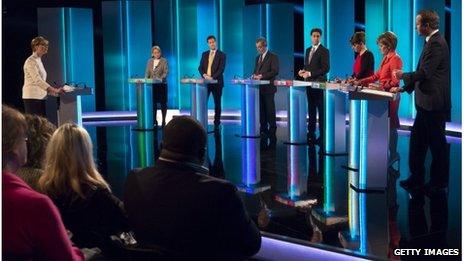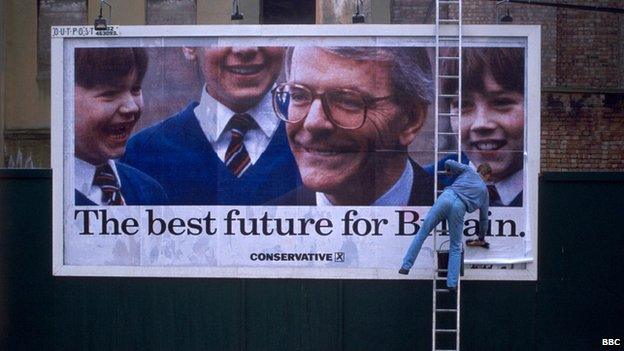Polls suggest log jam not shifting
- Published

Opinion polls have been suggesting a log-jam in UK politics for well over a year now and the early polls in the 2015 general election campaign don't yet point to any significant change.
In 12 campaign polls so far, six have suggested narrow Conservative leads, four had equally narrow Labour leads and the remainder were dead heats.
The average share of those not voting Conservative, Labour or Lib Dem in those polls was 24% - double the actual 12% who voted for parties outside the main three Westminster parties in 2010.
10,000m race
An average of those dozen polls suggests the Conservatives on 34%, three points down on their vote share in May 2010 - an election they lost; Labour also on a 34% average, some four points up on their dire 2010 performance; the Lib Dems on an average of 8% - one third of the support they received in 2010; UKIP's average was 14% (up 11 points on 2010) and the Greens were on 5% (up four points).
How these dozen individual poll results play out in 650 individual constituency contests on 7 May will doubtless be a joy to behold; but until then we mere mortals have to make what we can of the evidence.
Election 2015 poll tracker - BBC News
At present it appears like the finish of the 10,000 metres, where no-one has the momentum to break from the pack and everyone is bunched, waiting for the bell signalling the final lap.
If the Conservatives hoped to torpedo the television debates and limit any Ed Miliband bounce they seem to have been only partially successful.
Polls following both debates suggested that Ed Miliband performed as well as David Cameron, thus significantly better than his unprepossessing earlier, pre-debate, poll ratings would have suggested.
Extraordinary coup
Survation (sampled 2-3 April 2015) were first out of the blocks with a post-debate national poll that gave Labour a two-point lead and Ed Miliband his first-ever net positive approval rating with the company.
The Conservatives struggle to make headway on the economy. Perhaps one reason can be found in the Ashcroft poll (sampled 20-22 March, 2015) which suggested that 23% thought they and their family would be better off under the Conservatives, compared with 18% who thought they would be better off under Labour.

The Scottish situation
Polls in Scotland have been suggesting for months now that the Scottish National Party is on course for a major breakthrough at the election. The most recent are no different.
A Panelbase poll of 1,006 adults for The Sunday Times puts the SNP on 45% - an increase of four points since the last time the company polled for the newspaper in January. Labour sits on 29%, down two, while the Conservatives are unchanged on 14%. The Lib Dems - currently the party with the second highest number of MPs in Scotland - are on just 4% (although that is actually a modest 1% increase).
Equally concerning for Labour will have been a ComRes/ITV poll of Labour-held seats in Scotland, published at the start of the week. It suggested the SNP could take 43% of the vote in those seats- compared to just 19% in 2010. Labour are on course to win 37%, it suggests, compared to 51% last time. And support for the Lib Dems among those surveyed plummeted to just 2% (compared with 14% five years ago).

However, the key finding of the poll, it seemed to me, was the 53% who said that neither party would make a difference. The distinctive feature of the months approaching this election has been the number of opinion poll respondents who believe very strongly that none of the established Westminster parties has an answer to what they regard as the most important issues facing the country today.
The Lib Dems face one of their toughest challenges in many decades. Can they defy political gravity and hold on to many more seats than their national poll share suggests? Individual constituency polls point to them pulling off such an extraordinary coup. The big unknown is whether they can withstand ferocious assaults from both Labour and the Conservatives over the next few weeks.
UKIP also have to survive being squeezed. With around 40% of their support coming from 2010 Conservative voters they are playing an important part in this election. They seem to be losing a little of their share but nowhere near the collapse the Conservatives desperately need.
Subscribe to the BBC Election 2015 newsletter, external to get a round-up of the day's campaign news sent to your inbox every weekday afternoon.
- Published18 February 2015
